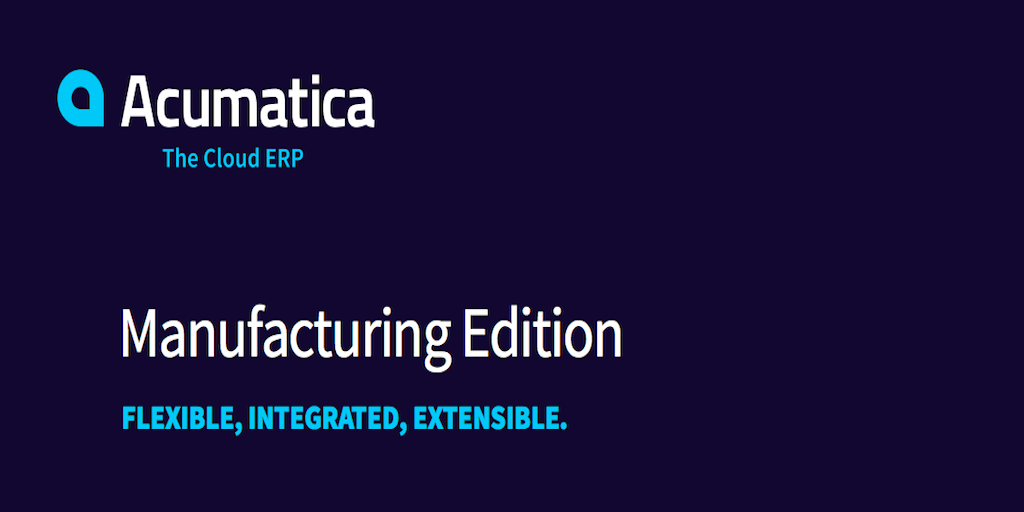Smart Manufacturing is a Game Changer for Electronics Manufacturing
Electrical Manufacturing Advances with Industry 4.0 and Smart Manufacturing Modern ERP solutions for the electronics manufacturing industry are...
4 min read
 Murray Quibell
Aug 30, 2024 4:08:15 PM
Murray Quibell
Aug 30, 2024 4:08:15 PM

The electronics manufacturing services industry is a cornerstone of modern technology, driving innovation and advancement across various sectors. From smartphones and computers to advanced medical devices and industrial machinery, electronic manufacturers produce the components that power the world. However, this industry faces unique challenges that can hinder growth and efficiency. Integrating ERP for electronics manufacturing solutions offers a strategic advantage, particularly when considering the benefits of systems like Acumatica.

ERP for electrical and electronics manufacturing offers comprehensive solutions to address these challenges. Integrating various business processes, providing a unified platform for operations management. Here are the key benefits:
Acumatica stands out as a leading cloud ERP for electronics manufacturing, offering robust features tailored to the needs of the electronics industry. Here are the key benefits of choosing Acumatica:
For electronics manufacturers, the transition to an ERP system like Acumatica can significantly improve operational efficiency, cost management, and overall competitiveness. Here’s how Acumatica addresses specific industry challenges:
Supply Chain Management: Acumatica helps manufacturers manage their supply chains better, reducing delays and ensuring timely component delivery. The system’s visibility tools help track shipments and manage supplier relationships more effectively.
Quality Control: Acumatica’s quality management tools help manufacturers maintain high standards. Manufacturers can ensure that their products meet customer expectations by tracking quality metrics and managing inspection processes.
Regulatory Compliance: Acumatica simplifies regulatory compliance by maintaining detailed records and ensuring that all processes adhere to industry standards. This reduces the burden on compliance teams and minimizes the risk of regulatory issues.
Inventory Management: Real-time inventory tracking and management features help manufacturers optimize inventory levels, reduce carrying costs, and ensure production lines run smoothly.
Cost Management: Acumatica provides detailed insights into production costs and operational efficiencies, helping manufacturers identify areas for cost reduction and improve profitability.
The electronics manufacturing industry faces numerous challenges that require strategic solutions to maintain competitiveness and efficiency. Integrating electronics manufacturing software offers significant advantages in streamlining operations, enhancing supply chain management, improving quality control, ensuring regulatory compliance, optimizing inventory, and managing costs.
Acumatica, a leading cloud ERP for electronics manufacturing, provides a robust, flexible, and scalable solution tailored to the industry's unique needs. Its comprehensive suite of tools, real-time data and analytics, user-friendly interface, and robust partner ecosystem make it an ideal choice for electronics manufacturers looking to overcome industry challenges and achieve sustained growth.
By leveraging the power of ERP for electrical and electronics manufacturing, businesses can not only navigate the industry's complexities but also position themselves for future success. Whether you're a small manufacturer or a large enterprise, the transition to an ERP system like Acumatica can transform your operations and drive significant improvements in efficiency and profitability.
Aqurus Solutions specializes in tailoring Acumatica's Cloud ERP Software to meet the unique needs of each business. We work closely with you to customize an implementation plan that drives efficiency and aligns with your objectives. Beyond initial setup, we build long-term relationships, offering continuous support and training to maximize your ERP system’s benefits.
Our commitment to customer satisfaction ensures that transitioning to new software is smooth and straightforward. As a gold-certified partner, Aqurus offers the expertise and experience necessary for a seamless migration to Acumatica, enabling you to harness your business's full potential in the digital landscape.
Ready to elevate your business with Acumatica? Contact us at (877) 355-6528 or schedule a no-obligation meeting and embark on a transformative journey with Aqurus Solutions as your guide.

Electrical Manufacturing Advances with Industry 4.0 and Smart Manufacturing Modern ERP solutions for the electronics manufacturing industry are...
 Read More
Read More

Aqurus Partnering with Acumatica in Booth #2517 to Showcase Smart Manufacturing ERP at CMTS 2025